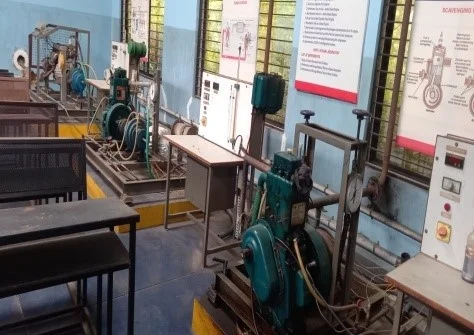Diploma in Automobile Engineering
- Home
- /
- Courses Offered

Diploma in Automobile Engineering at Ranippettai Polytechnic College is a specialized 3-year program designed to provide students with in-depth knowledge and skills in the design, development, manufacturing, and maintenance of automobiles and their components. The program focuses on vehicle mechanics, automotive systems, electronics, and the latest trends in the automobile industry, preparing students for careers in automotive engineering and maintenance.
Program Highlights:
Duration:
3 years (6 semesters)
Course Mode:
Full-time
Eligibility:
Candidates must have completed their 10th standard (SSLC) with a minimum of 35% marks in Science and Mathematics.
Curriculum Overview
The curriculum combines theoretical knowledge with practical skills, covering various aspects of automobile engineering. Some of the key subjects taught include:
- Engineering Mechanics - Introduction to basic principles of mechanics, focusing on forces, motion, and their application in vehicle systems.
- Automobile Engineering Fundamentals - Study of the fundamental concepts of automobile engineering, including types of vehicles, their parts, and the working of engines, transmissions, and other systems.
- Automobile Engines - Detailed study of internal combustion engines, their components, working principles, and performance characteristics. The course covers both petrol and diesel engines.
- Automobile Chassis and Body - Understanding the structure of a vehicle’s chassis, including the frame, suspension, and body design, with a focus on safety and ergonomics.
- Automobile Electrical and Electronics Systems - Focus on the electrical and electronic components of vehicles, including wiring, batteries, sensors, lighting systems, and modern advancements like electric vehicles (EVs).
- Vehicle Maintenance and Repair - Techniques for maintaining, diagnosing, and repairing automotive systems, such as the engine, transmission, suspension, brakes, and electrical systems.
- Automobile Air Conditioning and Heating - Study of HVAC (Heating, Ventilation, and Air Conditioning) systems used in automobiles, including refrigeration cycles, compressors, and their maintenance.
- Automotive Materials and Manufacturing Processes - Knowledge of the materials used in automobile construction, including metals, polymers, and composites, along with manufacturing processes like welding, casting, and molding.
- Vehicle Transmission Systems - Study of the design and functioning of various vehicle transmission systems, including manual and automatic gearboxes, clutches, and drive shafts.
- Automotive Safety and Regulations - Overview of safety features in automobiles, including airbags, crash testing, anti-lock braking systems (ABS), and vehicle safety standards and regulations.

